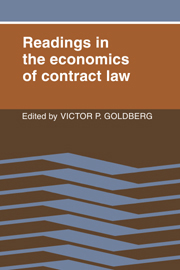Book contents
- Frontmatter
- Contents
- Preface
- Readings in the economics of contract law
- Part I Some preliminaries
- Part II Contract law and the least cost avoider
- Part III The expectation interest, the reliance interest, and consequential damages
- Part IV The lost-volume seller puzzle
- Part V Specific performance and the cost of completion
- Part VI Power, governance, and the penalty clause puzzle
- Part VII Standard forms and warranties
- Part VIII Duress, preexisting duty, and good faith modification
- 8.1 Duress by economic pressure, I
- 8.2 Gratuitous promises in economics and law
- 8.3 The mitigation principle: toward a general theory of contractual obligation (2)
- 8.4 The law of contract modifications: the uncertain quest for a benchmark of enforceability
- Questions and notes on duress
- Part IX Impossibility, related doctrines, and price adjustment
- Questions and notes on impossibility and price adjustment
- References
- Index of cases
- Author index
- Subject index
8.1 - Duress by economic pressure, I
Published online by Cambridge University Press: 10 November 2010
- Frontmatter
- Contents
- Preface
- Readings in the economics of contract law
- Part I Some preliminaries
- Part II Contract law and the least cost avoider
- Part III The expectation interest, the reliance interest, and consequential damages
- Part IV The lost-volume seller puzzle
- Part V Specific performance and the cost of completion
- Part VI Power, governance, and the penalty clause puzzle
- Part VII Standard forms and warranties
- Part VIII Duress, preexisting duty, and good faith modification
- 8.1 Duress by economic pressure, I
- 8.2 Gratuitous promises in economics and law
- 8.3 The mitigation principle: toward a general theory of contractual obligation (2)
- 8.4 The law of contract modifications: the uncertain quest for a benchmark of enforceability
- Questions and notes on duress
- Part IX Impossibility, related doctrines, and price adjustment
- Questions and notes on impossibility and price adjustment
- References
- Index of cases
- Author index
- Subject index
Summary
It seems … reasonable to say that a contract or payment secured by duress is defective not because of some difference in the nature of the consent, but because of the impropriety of the alternative presented; that is, of the pressure used. However, not every improper pressure is duress, since our legal system provides remedies that are reasonably effective in protecting the innocent against improper pressures under ordinary circumstances, and it is better to require the use of such remedies where practicable than to resort to an indiscriminate overhauling of transactions in court. The theory underlying this article is that, to constitute duress, the following elements are both essential and sufficient: (1) The transaction must be induced by a wrongful threat, (2) for which the law offers no adequate remedy, that is, no remedy which (by practical laymen's standards, not those of the common-law nor even of equity) is really sufficient to compensate for the wrong suffered if the threat should be carried out.…
Private individuals are … aware of the effectiveness in some situations of a threat to break a contract. In some contractual dealings, the two parties cannot always keep abreast of each other in performance as the work progresses. Inequalities of investment in preparation and performance, or other inequalities between the parties, create situations where one can exert considerable pressure on the other by a threat of disregard of contract obligations.
- Type
- Chapter
- Information
- Readings in the Economics of Contract Law , pp. 188 - 193Publisher: Cambridge University PressPrint publication year: 1982
- 3
- Cited by



